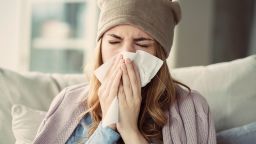Months after most mask requirements have come to an end and many people have stopped wearing them, some of the nation’s leading health experts are encouraging people to put their face masks back on – but this time, it’s not just because of Covid-19.
As a triple threat of respiratory illnesses – flu, RSV and Covid-19 – sweeps the nation this holiday season, health officials are urging people to take precautions to protect themselves: get vaccinated, wash hands frequently and even mask up in certain circumstances.
“There’s been a lot of attention directed to patients at higher risk of the complications of all of these illnesses – older persons, people who have any underlying illness, anyone who has immune compromise – I think, during this surge of this tridemic, if you will, there’s been a lot of ‘dust off your mask. Put your mask back on,’ ” said Dr. William Schaffner, a professor in the Division of Infectious Diseases at Vanderbilt University Medical Center and medical director of the National Foundation for Infectious Diseases.
At this phase in the Covid-19 pandemic, even with other types of respiratory viruses circulating, masking recommendations based on an individual’s risk have been at the center of public health discussions, “rather than saying everyone in a community has got to put their masks back on,” Schaffner said.
“I don’t want to go to mandates because I think over much of the United States, you will get a lot of pushback, and people will ignore it. Public health recommendations have to be acceptable,” he added.
“The notion that during these kinds of viral surges, that people at risk should be wearing masks and being more cautious seems entirely reasonable – and I add to that, particularly in this part of the country, that we should be accepting, tolerant and indeed supporting people who do that, because they have a reason,” said Schaffner, who is based in Nashville.
“Don’t look at this as a political statement or a social statement. This is a purely health-related statement.”
Some communities across the country are considering bringing back certain masking recommendations as the wave of respiratory illnesses worsens.
Local officials mulling over masks
The US Centers for Disease Control and Prevention offers specific guidance on when masking is recommended based on its Covid-19 community levels.
The agency says that people may choose to wear masks at any time but that a “high-quality mask or respirator” is recommended for everyone when a county has a “high” Covid-19 community level.
As of Thursday, about 5.66% of US counties have high community levels, including some places in Arizona, Wyoming, Oregon and the Dakotas.
Los Angeles County is at a high Covid-19 community level, but it hasn’t hit all three indicators that would trigger a mask mandate, Public Health Director Barbara Ferrer said Thursday.
The county has 258 new Covid-19 cases per 100,000 people and 14.8 hospitalizations per 100,000 people but continues to stay below the “high” level of staffed Covid patient beds, at 6.9%, she said.
Officials will consider masks again if that level goes over 10%, Ferrer said, but she’s hopeful that metrics might improve before then.
Even without a mandate, she emphasized community efforts like wearing masks inside when possible and getting Covid-19 vaccines or boosters.
“We haven’t reached that super dangerous threshold where CDC has said ‘you really need to start worrying about your hospital system,’ but we’ve reached a threshold, and all of the data shows this, where there is too much transmission, and it’s creating a lot of risk. And the time to mitigate the risk is actually now,” Ferrer said.
Throughout the Covid-19 pandemic, Los Angeles County has been at the forefront of implementing mitigation measures. In this case, officials would be following CDC guidance about masking and community levels.
“What L.A. County is doing is, they’re looking at their uptick in cases, hospitalizations and deaths, and they’re seeing a trending upwards toward that high community transmission level, and they’re preparing to reimplement the guidance that goes along with high community transmission, and that is to reimplement universal masking,” said Lori Tremmel Freeman, chief executive officer of the National Association of County and City Health Officials.
Every community has been looking at the same guidance, considering whether they are approaching high levels and might have to consider universal masking again, Freeman said.
“Now, I say all that based on the pure facts of the guidance, but I do think that has the possibility again of turning into a political divide in community by community where elected officials and others may or may not wish to see universal masking reimplemented. But we will have to see if that legal divide enters the picture again,” she said. “There’s not a lot of appetite for some of these original mitigation efforts to be reimplemented.”
In New York, state officials have encouraged schools and communities to take precautions such as indoor public masking as RSV, Covid-19 and the flu circulate, according to a letter from Health Commissioner Dr. Mary Bassett and Education Commissioner Betty Rosa.
The letter, issued Monday, warned of the multiple respiratory viruses that are straining the state’s health-care facilities.
Over the past three weeks, New York’s flu hospitalizations have more than doubled, and lab-confirmed flu cases have nearly tripled, according to the letter.
“In response, we are urging a community-wide approach, inclusive of schools, to again take precautions this holiday season and winter that can prevent the spread of respiratory viruses and protect young children, older individuals, and those with underlying health conditions,” the commissioners wrote.
The letter said schools and communities should encourage indoor public masking, vaccination and frequent hand-washing, among other measures.
“We encourage schools to utilize their local departments of health as a partner and resource in this work,” the commissioners said. “Together, we will ensure that all students in our state have a healthy and safe holiday season.”
‘We do encourage people to mask’
The CDC’s Covid-19 community level metrics for US counties are based on three things: new Covid-19 hospitalizations, hospital capacity and new Covid-19 cases. But the agency is looking into revisiting these community levels, possibly to include data on other respiratory viruses such as flu and RSV, Director Dr. Rochelle Walensky said Monday.
“It’s something that we are actively looking into at CDC. In the meantime, what I do want to say is, one need not to wait for CDC action in order to put a mask on,” she said.
“We do know that 5% of the population is living in places with a high Covid-19 community level. We do encourage people to mask,” she said, adding that people should stay home when sick, practice good hygiene like washing hands frequently and improve air ventilation in indoor spaces.
Covid-19 hospitalizations are starting to tick up after Thanksgiving: More than 34,000 people were admitted to the hospital with Covid-19 in the past week, up 20% from the week prior, according to the CDC. Ensemble forecasts from the CDC predict continued increase over the next month or so.
About 1,800 Covid-19 deaths were reported to the CDC in the last week of November, and ensemble forecasts that predict Covid deaths will remain steady for the next month or so.
Get CNN Health's weekly newsletter
- Sign up here to get The Results Are In with Dr. Sanjay Gupta every Friday from the CNN Health team.
Dr. Anthony Fauci, who is stepping down this month as director of the National Institute of Allergy and Infectious Diseases, said he is not afraid to recommend a return to masking in some circumstances as the nation faces a triple threat of Covid-19, flu and RSV.
“I’m not talking about mandating anything,” Fauci said Wednesday on “NBC Nightly News.” “I’m talking about just common sense of saying, ‘You know, I really don’t want to take the risk of myself getting infected and, even moreso, spreading it to someone who’s a vulnerable member of my family.’ “
CNN’s Taylor Romine, Nicki Brown and Deidre McPhillips contributed to this report.








